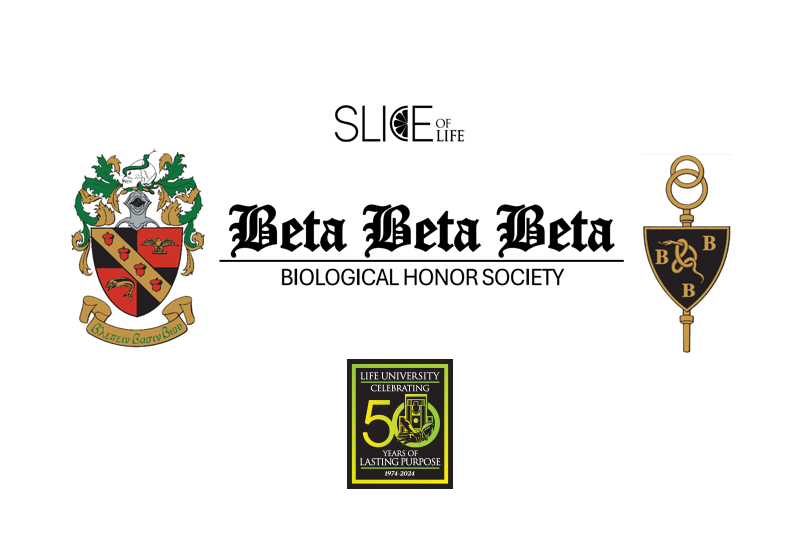“If I were to attempt to describe the typical Beta Beta Beta chapter, I should say that it is a group of from twenty to thirty upperclass, undergraduate students of superior scholastic attainment with a faculty counselor and one or more faculty members. The group meets semi-monthly for chapter business and programs originating with its own members or with occasional outside speakers. In addition to its meetings, the chapter carries out several projects of scientific or educational value during the year and participates in one or more activities sponsored by the national organization. It should be added, however, that there are many deviations from a program such as this and that there is no desire to establish a definite pattern of chapter activity. Beta Beta Beta insists only that each chapter shall function usefully. In some colleges it does this by being highly honorary; in a few colleges it functions largely as a seminar group; in other colleges the provisional (associate) membership plan is used to include nearly all eligible biology majors.”
FRANK G. BROOKS, Founder, Beta Beta Beta Biological Society
What is the Tri-Beta Society at Life University?
Tri-Beta is a collegiate honor society and academic fraternity for students of the biological sciences. The society recently installed Life University’s (Life U’s) Beta Beta Beta Chapter (Lambda Upsilon Gamma) in December 2023, and Life U is honored to have them here on our campus.
The Tri-Beta, Life U Chapter mission statement states, “At Life U, our Tri-Beta chapter is focused on making biology accessible to everyone, sparking curiosity and supporting undergraduate research. We strive to inspire interest in biology through outreach and educational efforts while providing opportunities for students to engage in meaningful research projects.”
This prestigious organization looks to enhance Life U’s holistic scientific values through participation in research and other areas of the sciences, showcasing Life U on the national level. These students will have opportunities to present original research at competitions and receive funding from the national office. Also, the amount of learning and growth that will be available to students is astounding. Our students are always looking to improve themselves, and we want to enhance that ambition.
According to the Tri-Beta national website, “Beta Beta Beta Biological Honor Society seeks to encourage scholarly attainment in this field of learning by reserving its regular membership for those who achieve superior academic records and who indicate special aptitude for and major interest in the life sciences. It desires to cultivate intellectual interest in the natural sciences and to promote a better appreciation of the value of biological study, and thus welcomes into associate membership all those students who are interested in biology. Tri-Beta endeavors, also, to extend the boundaries of man’s knowledge of nature by encouraging new discoveries through scientific investigation, and to this end, encourages undergraduate students to begin research work and report their findings in the journal of the society, BIOS.”
Since our goal at Life U is to teach others about vitalistic health care on a global level, Tri-Beta is a natural fit and will only expand our knowledge and growth at the University.
To understand where we are headed as an institution, we must first understand our history, and it is only fitting that we are celebrating Life U’s 50th anniversary this year.
Life U began as Life Chiropractic College in 1974 and was the dream child of Dr. Sid E. Williams, Life U’s founder and first president. His passion for vitalistic healthcare through Chiropractic was the foundation for the massive growth both a healthcare movement and the institution for which he was at the helm.
Let us now take a closer look at the history of Tri-Beta to better understand how our missions align with each other and will benefit society globally going forward.
“TriBeta was founded in 1922 at Oklahoma City University — the Alpha Chapter — by Dr. Frank G. Brooks and a group of his students. The idea of an honor and professional society for biology students spread rapidly, and by 1925, the society was a national organization. Biennial national conventions of student and faculty members began in that year, and in 1930, the society journal, BIOS, began publication of student research, articles of interest to biologists and society news. As the society grew, it was divided into regional and district groups, each of which holds a convention annually. At the heart of every district and national meeting are student research papers presented in the style of graduate meetings. Awards are given for outstanding individual and chapter accomplishment,” according to their national website.
Let us today celebrate the immense accomplishments already made here at Life U and look forward to at least another 50 years and beyond!
Congratulations to Life U Tri-Beta Chapter Current Members:
Carly Burington
Cynthia Jeptoo
Dorothy N. Trent- President
Jeilyannie Rivera
Lilja B. Olafsdottir
Madeline J. Welch
Megan Cronje- Historian
Nellie A. Pedersen
Click on the Tri-Beta link for more information.


Social Media